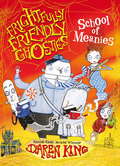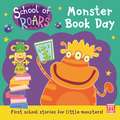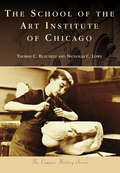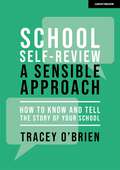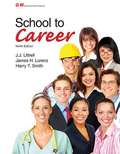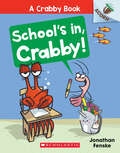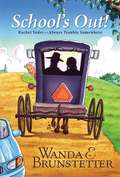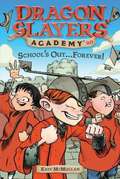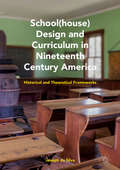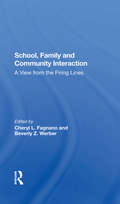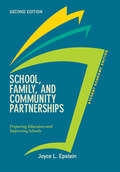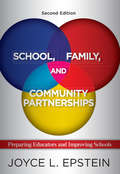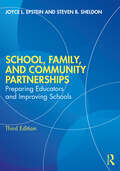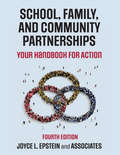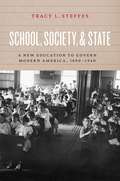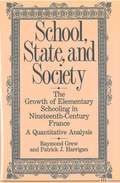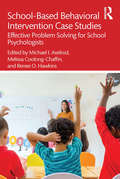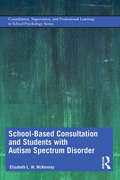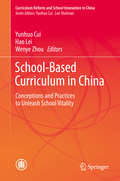- Table View
- List View
School of Meanies (Frightfully Friendly Ghosties #3)
by Daren King'Ghost School is stupid and rubbish, and, um, I'm not going to Ghost School ever again!' Bumping is Humphrey Bump's best thing - even better than cakes and lollipops! But the nasty headmaster at ghost school doesn't agree. He expels Humphrey for - you've got it! - bumping. So the other ghosties - Agatha, Tabitha and Wither -find Humphrey a place at still-alive school. They are also on hand to help him make friends. Wither invisibly writes a spooky poem on the board, Agatha sends children whirling into the clouds, and they all whisp out of Humphrey's satchel during lessons. The still-alive children are so mean they only run away. But they are nothing compared to the still-alive headmaster who is the biggest bully ever. Can Humphrey gather all the ghosties together to fight the bully, save the school and make lots of new friends?
School of Roars: Monster Book Day
by School of RoarsIt's time to go to the School of Roars! Join the monsters for a roarsome day.It's Monster Book Day and the monsters are having fun dressing up as their favourite book characters. But Icklewoo doesn't like her silly, frilly Cinderella dress. Can Wufflebump help her transform her outfit into something suitably monstrous? Brilliantly exploring first experiences and featuring themes of kindness, friendship and problem-solving, this School of Roars story is perfect for little monsters everywhere!Also available: School of Roars: Show and Tell, School of Roars: Bestest Friends and School of Roars: Icky Sticky Stickers
School of the Art Institute of Chicago, The (Campus History)
by Nicholas C. Lowe Thomas C. BuecheleIn 2016, the School of the Art Institute of Chicago (SAIC) reached its 150th year. What sustains an institution is sometimes extraordinary, sometimes mundane, and often simply a matter of the sheer will of those involved. An unparalleled museum school, SAIC embodies something greater than the individuals who have passed through it, and yet it has also depended upon the unique and special nature of its protagonists—its founders who survived the Great Chicago Fire and rebuilt the school, a president who cast the hands and face of Abraham Lincoln, an alumna who was a celebrated illustrator and an activist in the women’s suffrage movement, the creators of monumental sculptures throughout the country, and numerous scholars of art history and technique—to challenge and shape its form. The school’s history is punctuated by marvelous moments of heightened public discourse in art making and scholarship. This book represents a glimpse into the lives of generations of students, staff, and faculty as full participants in an astounding learning environment.
School self-review – a sensible approach: How to know and tell the story of your school
by Tracey O'BrienThis book looks at the sensible and meaningful role of self-review in creating sustainable improvement in all areas across secondary schools. It outlines a self-review approach focussed on key principles which ensure this approach is transparent, purposeful, does not negatively impact on workload, that does not use the same approach for all teams and that does actually result in clear ideas for school improvement. It discusses claims of effective self-review including that it challenges thinking, leads to improvement, incorporates a range of stakeholders, skills people up, and helps build professional communities.The book is full of examples and case studies so that the reader can transfer some of these ideas to their context, discuss them at meetings and help generate new ideas. It challenges the 'deep dive' approach as something that should be left to Ofsted and instead suggests that leaders should know daily what is happening in their schools, and instead work with staff to design self-review activities that are bespoke and fit for purpose.The main theme is around 'improve not prove', where stakeholders feel involved, valued and empowered to be change-makers at a range of scales. It examines how effective self-review can reduce workload and support improvements in wellbeing.
School self-review – a sensible approach: How to know and tell the story of your school
by Tracey O'BrienThis book looks at the sensible and meaningful role of self-review in creating sustainable improvement in all areas across secondary schools. It outlines a self-review approach focussed on key principles which ensure this approach is transparent, purposeful, does not negatively impact on workload, that does not use the same approach for all teams and that does actually result in clear ideas for school improvement. It discusses claims of effective self-review including that it challenges thinking, leads to improvement, incorporates a range of stakeholders, skills people up, and helps build professional communities.The book is full of examples and case studies so that the reader can transfer some of these ideas to their context, discuss them at meetings and help generate new ideas. It challenges the 'deep dive' approach as something that should be left to Ofsted and instead suggests that leaders should know daily what is happening in their schools, and instead work with staff to design self-review activities that are bespoke and fit for purpose.The main theme is around 'improve not prove', where stakeholders feel involved, valued and empowered to be change-makers at a range of scales. It examines how effective self-review can reduce workload and support improvements in wellbeing.
School to Career
by Harry T. Smith J. J. Littrell James H. LorenzSchool to Career helps prepare students to achieve success in high school, college, career, and life. In this text, students are presented with information they need today to make career choices tomorrow. In order to prepare students for their future, twenty-first century life and career skills are introduced in the text as well as personal skills, decision-making skills, technology skills, and employability skills. Skills for success such as teamwork and problem solving, communicating on the job, and leadership are also covered. Opportunities are presented to research careers using the 16 national career clusters, as established by the States' Career Clusters Initiative, to help define future goals. As part of the learning process, students will assess graduation plans and explore college and other post-secondary programs that might help them reach their goals. College access and funding an education are also covered. School to Career is the first step for preparing for the challenges faced after graduation. By studying this text, students will be able to make the most of their study time and learn how to prepare for the future.
School's In, Crabby!: An Acorn Book (A Crabby Book)
by Jonathan FenskeSchool is in session for the ocean's crankiest crab!Pick a book. Grow a Reader!This series is part of Scholastic's early reader line, Acorn, aimed at children who are learning to read. With easy-to-read text, a short-story format, plenty of humor, and full-color artwork on every page, these books will boost reading confidence and fluency. Acorn books plant a love of reading and help readers grow!It's just another day in the ocean for Crabby and Plankton -- until they find themselves INSIDE a school of fish! This gives Plankton a fabulous idea -- he and Crabby should play school! But Crabby does not want to play. In four hilarious stories, Crabby uses funny wordplay to distract Plankton from teaching.With comic speech bubbles and full-color artwork throughout, Geisel Award Honoree Jonathan Fenske's early reader series is sure to be a hit with new readers!
School's Out! (Rachel Yoder, Always Trouble Somewhere Series Book #1)
by Wanda E. BrunstetterLook out, Lancaster County! School's out! And so is an energetic Amish girl with trouble following close on her barefooted heels! When nine-year-old Rachel Yoder isn't bringing frogs to church or taking wild buggy rides, she's setting fireflies free and trying out new skateboards in all the wrong places. Will Rachel's friends and family survive the mischief she brings into their lives--and will Rachel learn any life lessons along the way?
School's Out...Forever! (Dragon Slayers' Academy #20)
by Kate Mcmullan Bill Basso Stephen GilpinIt's Graduation Day at DSA! Fans have been requesting another DSA book for years. And here it is! While money-hungry headmaster Mordred is busy planning DSA's conversion into a deluxe casino, Wiglaf and his friends are on a mission to find their dragon buddy Worm. Unsuccessful in their quest, the group returns to see the school set up for a surprise graduation. Will Worm reunite with his friends before the doors close? And what comes next for the young knights in training? Find out in the much anticipated finale to McMullan's hilarious fantasy series.
School(house) Design and Curriculum in Nineteenth Century America: Historical and Theoretical Frameworks
by Joseph Da SilvaThis book examines the formative relationship between nineteenth century American school architecture and curriculum. While other studies have queried the intersections of school architecture and curriculum, they approach them without consideration for the ways in which their relationships are culturally formative—or how they reproduce or resist extant inequities in the United States. Da Silva addresses this gap in the school design archive with a cross-disciplinary approach, taking to task the cultural consequences of the relationship between these two primary elements of teaching and learning in a ‘hotspot’ of American education—the nineteenth century. Providing a historical and theoretical framework for practitioners and scholars in evaluating the politics of modern American school design, the book holds a mirror to the oft-criticized state of American education today.
School, Family, And Community Interaction: A View From The Firing Lines
by Cheryl L Fagnano Beverly WerberMost Americans will agree that, among other things, a quality education begins with meaningful interaction between families and schools. Yet as the contributors to this volume point out, several aspects of contemporary American society undermine the critical relationship among schools, families and their communities, and these conditions contribute
School, Family, and Community Partnerships
by Joyce L EpsteinHow can teachers and administrators be prepared to create partnerships with families and communities? Nationwide, rhetoric in favor of parent involvement is high, but the quality of most programs still is low. Part of the problem is that most teacher education, administrative training, and other education of school professionals omit topics of school, family, and community partnerships. Instead, educators are prepared in limited ways to "deal with parents" when problems occur.Well-known and respected author Joyce Epstein updates her acclaimed School, Family, and Community Partnerships to reflect the past ten years of study and advancements. New readings address this growing field and offer expanded consideration of district leadership and its impact on school programs. Epstein contends it is now possible to prepare teachers and administrators with a solid base of knowledge on partnerships. Theoretical perspectives and results from research and development can and should be shared with educators. As partners, parents and teachers share responsibility for the education and development of their children. Common messages and collaborative activities of home and school help to promote student success, prevent problems, and solve those that arise. Epstein provides the material needed to help current educators and educators in training think about, talk about, and then act to develop comprehensive programs of school, family, and community partnerships.This collection is designed for use in courses of teacher education, preparation of school administrators, and other courses that prepare professionals to understand and to work in schools and with families and students. It is a definitive resource both in and out of the classroom with comments, discussion questions, activities, and field experiences in each of the chapters.
School, Family, and Community Partnerships
by Joyce L. EpsteinUpdated and revised throughout, Joyce EpsteinOCOs classic book provides a framework for thinking about, talking about, and actually building comprehensive programs for school and family partnerships.
School, Family, and Community Partnerships
by Joyce L. EpsteinFor undergraduate and graduate students in education, psychology, sociology, and educational administration, Epstein (sociology, Johns Hopkins U. ) brings together 18 readings that describe how teachers and administrators can create positive and productive partnerships with families and communities. The readings address the theory, research, policy, and practice of these partnerships, along with comments, discussions, activities, and projects (many added or updated for this edition). This edition also has new and updated material that incorporates recent research and includes a literature review of new directions for partnership program developments, a summary of research on homework, and new approaches to district and state-level leadership and policies. Annotation ©2011 Book News, Inc. , Portland, OR (booknews. com)
School, Family, and Community Partnerships, Student Economy Edition: Preparing Educators and Improving Schools
by Joyce EpsteinUpdated and revised throughout, Joyce Epstein's classic book provides a framework for thinking about, talking about, and actually building comprehensive programs for school and family partnerships.
School, Family, and Community Partnerships: Preparing Educators and Improving Schools
by Joyce L EpsteinSchool, Family, and Community Partnerships: Preparing Educators and Improving Schools addresses a fundamental question in education today: How will colleges and universities prepare future teachers, administrators, counselors, and other education professionals to conduct effective programs of family and community involvement that contribute to students' success in school?The work of Joyce L. Epstein has advanced theories, research, policies, and practices of family and community involvement in elementary, middle, and high schools, districts, and states nationwide. In this second edition, she shows that there are new and better ways to organize programs of family and community involvement as essential components of district leadership and school improvement.THE SECOND EDITION OFFERS EDUCATORS AND RESEARCHERS:? A framework for helping rising educators to develop comprehensive, goal-linked programs of school, family, andcommunity partnerships.? A clear discussion of the theory of overlapping spheres of influence, which asserts that schools, families, and communitiesshare responsibility for student success in school.? A historic overview and exploration of research on the nature and effects of parent involvement.? Methods for applying the theory, framework, and research on partnerships in college course assignments, classdiscussions, projects and activities, and fi eld experiences.? Examples that show how research-based approaches improve policies on partnerships, district leadership, andschool programs of family and community involvement.Definitive and engaging, School, Family, and Community Partnerships can be used as a main or supplementary text in courses on foundations of education methods of teaching, educational administration, family and community relations, contemporary issues in education, sociology of education, sociology of the family, school psychology, social work, education policy, and other courses that prepare professionals to work in schools and with families and students.
School, Family, and Community Partnerships: Preparing Educators and Improving Schools
by Joyce L. Epstein Steven B. SheldonSchool, Family, and Community Partnerships: Preparing Educators and Improving Schools, 3rd Edition prepares future teachers and administrators to conduct effective and equitable programs of family and community engagement that contribute to student success in school. Renowned authors Joyce L. Epstein and Steven B. Sheldon present the theories, research, policies, and practices that have been shown to improve the design and conduct of partnership programs in diverse communities and at all grade levels. Chapters include a historic overview of early research, recent studies with advanced methods, and many examples of research-based approaches for district leadership and school improvement. All chapters include discussion questions and classroom assignments that professors may use to provoke thinking and help future educators understand that family and community engagement is part of their professional work. New in this 3rd Edition: Updated, streamlined readings make it easy for students to explore early, influential studies that framed the field and recent studies of multilevel effects of leadership for partnerships. Comments, discussion topics, and classroom activities challenge students to think deeply about many aspects and issues of school, family, and community partnerships. Interview assignments enable students to hear the voices and views on partnerships of practicing educators, parents, students, and others in the community. Readings and activities across chapters help colleges and universities meet new standards of the Council for the Accreditation of Educator Preparation (CAEP) for graduates to "demonstrate their ability to effectively work with diverse P-12 students and their families." After decades of research and exemplary practice that confirm that family and community engagement is an essential component of good school organization, most new teachers and administrators still are unprepared to partner with all families to support student learning and development. This book will help professors in Schools, Colleges, and Departments of Education (SCDE) prepare their graduates to understand, organize, and continually improve partnership programs in all schools, with all families, and for all students.
School, Family, and Community Partnerships: Your Handbook for Action
by Dr Mavis G. Sanders Steven Sheldon Dr Joyce L. Epstein Beth S. Simon Karen Clark Salinas Natalie R. Jansorn Frances L. VanVoorhis Cecelia S. Martin Brenda G. Thomas Marsha D. Greenfield Ms Darcy J. Hutchins Kenyatta J. WilliamsStrengthen family and community engagement to promote equity and increase student success! When schools, families, and communities collaborate and share responsibility for students' education, more students succeed in school. Based on 30 years of research and fieldwork, this fourth edition of a bestseller provides tools and guidelines to use to develop more effective and equitable programs of family and community engagement. Written by a team of well-known experts, this foundational text demonstrates a proven approach to implement and sustain inclusive, goal-oriented programs. Readers will find: Many examples and vignettes Rubrics and checklists for implementation of plans CD-ROM complete with slides and notes for workshop presentations
School, Family, and Community Partnerships: Your Handbook for Action
by Dr Mavis G. Sanders Steven Sheldon Dr Joyce L. Epstein Beth S. Simon Karen Clark Salinas Natalie R. Jansorn Frances L. VanVoorhis Cecelia S. Martin Brenda G. Thomas Marsha D. Greenfield Ms Darcy J. Hutchins Kenyatta J. WilliamsStrengthen family and community engagement to promote equity and increase student success! When schools, families, and communities collaborate and share responsibility for students' education, more students succeed in school. Based on 30 years of research and fieldwork, this fourth edition of a bestseller provides tools and guidelines to use to develop more effective and equitable programs of family and community engagement. Written by a team of well-known experts, this foundational text demonstrates a proven approach to implement and sustain inclusive, goal-oriented programs. Readers will find: Many examples and vignettes Rubrics and checklists for implementation of plans CD-ROM complete with slides and notes for workshop presentations
School, Society, & State: A New Education to Govern Modern America,1890-1940
by Steffes Tracy L."Democracy has to be born anew every generation, and education is its midwife," wrote John Dewey in his classic work The School and Society. In School, Society, and State, Tracy Steffes places that idea at the center of her exploration of the connections between public school reform in the early twentieth century and American political development from 1890 to 1940. American public schooling, Steffes shows, was not merely another reform project of the Progressive Era, but a central one. She addresses why Americans invested in public education and explains how an array of reformers subtly transformed schooling into a tool of social governance to address the consequences of industrialization and urbanization. By extending the reach of schools, broadening their mandate, and expanding their authority over the well-being of children, the state assumed a defining role in the education--and in the lives--of American families. In School, Society, and State, Steffes returns the state to the study of the history of education and brings the schools back into our discussion of state power during a pivotal moment in American political development.
School, Society, and State: A New Education to Govern Modern America, 1890-1940
by Tracy L. Steffes“Democracy has to be born anew every generation, and education is its midwife,” wrote John Dewey in his classic work The School and Society. In School, Society, and State, Tracy Steffes places that idea at the center of her exploration of the connections between public school reform in the early twentieth century and American political development from 1890 to 1940.American public schooling, Steffes shows, was not merely another reform project of the Progressive Era, but a central one. She addresses why Americans invested in public education and explains how an array of reformers subtly transformed schooling into a tool of social governance to address the consequences of industrialization and urbanization. By extending the reach of schools, broadening their mandate, and expanding their authority over the well-being of children, the state assumed a defining role in the education—and in the lives—of American families.In School, Society, and State, Steffes returns the state to the study of the history of education and brings the schools back into our discussion of state power during a pivotal moment in American political development.
School, State, and Society: A Quantitative Analysis
by Raymond Grew Patrick J. HarriganA study of elementary education in France in the 1800s
School-Based Behavioral Intervention Case Studies: Effective Problem Solving for School Psychologists
by Michael I. Axelrod Melissa Coolong-Chaffin Renee O. HawkinsSchool-Based Behavioral Intervention Case Studies translates principles of behavior into best practices for school psychologists, teachers, and other educational professionals, both in training and in practice. Using detailed case studies illustrating evidence-based interventions, each chapter describes all the necessary elements of effective behavior intervention plans including rich descriptions of target behaviors, detailed intervention protocols, data collection and analysis methods, and tips for ensuring social acceptability and treatment integrity. Addressing a wide array of common behavior problems, this unique and invaluable resource offers real-world examples of intervention and assessment strategies.
School-Based Consultation and Students with Autism Spectrum Disorder (Consultation, Supervision, and Professional Learning in School Psychology Series)
by Elizabeth L. McKenneySchool-Based Consultation and Students with Autism Spectrum Disorder examines the preventive and remedial powers of consultation for indirectly supporting the needs of youth with Autism Spectrum Disorder (ASD), through collaborating with their parents and educators. Given the unprecedented numbers of students with ASD in schools, and the variety of evidence-based interventions currently available, consultation helps ensure appropriate service delivery across the range of student functioning. Focusing on foundational knowledge and skills that school consultants need to incorporate ASD service delivery into their research and practice, this text addresses consistent and effective service delivery for students with ASD to optimize their positive academic, behavioral, adaptive, and social communicative outcomes. Highlighting relevant cross-cultural research throughout its chapters, the book concludes with a section on future directions in the field that includes areas for improvement in meeting the needs of diverse students, families, and schools.
School-Based Curriculum in China: Conceptions and Practices to Unleash School Vitality (Curriculum Reform and School Innovation in China)
by Yunhuo Cui Hao Lei Wenye ZhouThis book first develops a framework to understand the curriculum administration system in China. It describes the historical process of localizing school-based curricula as well as the significance and positioning of school-based curricula, and presents in detail cases of how three types of school-based curriculum were developed and implemented in Chinese schools.The book outlines for the first time best practices in school-based curriculum development in China, i.e. how to make a holistic curriculum plan, how to design a curriculum, and how to develop a course in the context of a school-based curriculum. By discussing these three aspects, it clearly summarizes the strategies and technologies for school-based curriculum development, which are applicable across contexts.Although the concept originated outside China, school-based curriculum development in China differs from that in other countries both in theory and practice. This book equips readers with theoretical and practical knowledge of how to develop school-based curricula and how to generate experiences for new curriculum development.This timely book is a valuable resource for researchers, curriculum designers, school teachers and others who are interested in school-based curriculum development.
